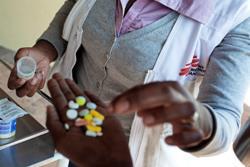Mpumalanga women failing to go for cervical cancer checks

But healthcare workers, who are aware of the ongoing challenges at clinics, are appealing to women to continue to go for their tests even if they believe it to be a waste of time.
Cervical cancer is the second most common form of cancer among South African women after breast cancer. South Africa’s rates of cervical cancer are almost twice as high as the global average, with women living with HIV being at even greater risk of developing the cancer.

Some women in rural communities don’t go for Pap smear tests because they believe that only women who are sexually active and HIV positive women are at risk.
Nokuthula Nkosi (39) from Esabelweni said “I have never gone for a Pap smear because I thought it was for women who are sexually active and HIV positive women only. With my husband being dead for 13 years, I honestly believed that I was safe.”
Most cervical cancers are caused by the human papillomavirus (HPV), which is sexually transmitted. But women who contract HPV can be infected for many years without knowing, so it is important for them to have regular Pap tests in order to check.
Even though I know it is important to go for a Pap smear, I don’t go. The last time I did a Pap test was 2013. I stopped after that because I never received my results. I went to get them several times, but they kept on saying ‘Come back next week’.
Some women, like Connie Sibiya, have stopped doing Pap smear tests because they don’t receive their results from the clinic.
“Even though I know it is important to go for a Pap smear, I don’t go. The last time I did a Pap test was 2013. I stopped after that because I never received my results. I went to get them several times, but they kept on saying ‘Come back next week’,” she said.
According to professional nurse Zodwa Zwane, “At some clinics the test results are not properly being filed, or they are lost. But that doesn’t mean women should not do their Pap smears.”
According to Silindile Masinga, another woman who has not been going for her tests, the biggest challenge is because government facilities that offer the service only do it once a week, making it difficult for people who work.
“I am living with HIV, and I know I should do a Pap smear at least twice a year. I remember I once visited a clinic in Ermelo, but I couldn’t go because I was told that only 11 women can be seen that day and I should come the following Friday before 8am,” she said, explaining why she has not gone.
An edited version of this story appeared on Health24.
Author
Republish this article
This work is licensed under a Creative Commons Attribution-NoDerivatives 4.0 International License.
Unless otherwise noted, you can republish our articles for free under a Creative Commons license. Here’s what you need to know:
You have to credit Health-e News. In the byline, we prefer “Author Name, Publication.” At the top of the text of your story, include a line that reads: “This story was originally published by Health-e News.” You must link the word “Health-e News” to the original URL of the story.
You must include all of the links from our story, including our newsletter sign up link.
If you use canonical metadata, please use the Health-e News URL. For more information about canonical metadata, click here.
You can’t edit our material, except to reflect relative changes in time, location and editorial style. (For example, “yesterday” can be changed to “last week”)
You have no rights to sell, license, syndicate, or otherwise represent yourself as the authorized owner of our material to any third parties. This means that you cannot actively publish or submit our work for syndication to third party platforms or apps like Apple News or Google News. Health-e News understands that publishers cannot fully control when certain third parties automatically summarise or crawl content from publishers’ own sites.
You can’t republish our material wholesale, or automatically; you need to select stories to be republished individually.
If you share republished stories on social media, we’d appreciate being tagged in your posts. You can find us on Twitter @HealthENews, Instagram @healthenews, and Facebook Health-e News Service.
You can grab HTML code for our stories easily. Click on the Creative Commons logo on our stories. You’ll find it with the other share buttons.
If you have any other questions, contact info@health-e.org.za.
Mpumalanga women failing to go for cervical cancer checks
by cynthiamaseko, Health-e News
September 1, 2016



